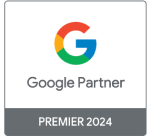As a local or small business owner, taking advantage of digital marketing is no longer optional. In fact, small businesses who neglect their digital presence risk being left behind and overtaken by the competition, so it’s crucial to make this a priority.
Whether you’re not sure where to begin or you’re stuck for inspiration, our digital marketing tips aim to offer plenty of ideas for growing your small business and getting noticed by potential customers.
Our 10 digital marketing tips for small businesses include:
- Speak to your customers
- Research competitors and differentiate yourself
- Get your website basics right
- Improve Google My Business listing and customer reviews
- Create interesting blog content
- Create professional visual content
- Improve your local SEO
- Develop email marketing
- Focus on a primary social media channel
- Partner with local influencers
1. Speak to your customers
You can’t build a successful marketing strategy based on guesswork. This is why we highly recommend spending some time speaking with current customers and, if possible, potential customers too. You may already have a good understanding of who your customers are and their needs but, if you want to build a long-lasting and successful relationship with them, you will need to dig deeper. Interviews and surveys are free to run and you can start small, focusing on just a few, specific themes you want to explore further. A handful of insights from users are infinitely better than none at all.
For further information on how to get to know your customers better, take a look at our essential guide to market research.
2. Research competitors and differentiate yourself
Competitor research is important because as a local business, you’ll want to be able to offer additional value in the market. What can you offer to potential customers that your competitors can’t? Google Search is a great place to start. You can see how your competitors are positioning themselves within their ads. The example below shows Google Search Ads results for local Nottingham plumbers. Terms such as “No Call Out Fee”, “12 Month Guarantee” and “Same Day Service” are great selling points.
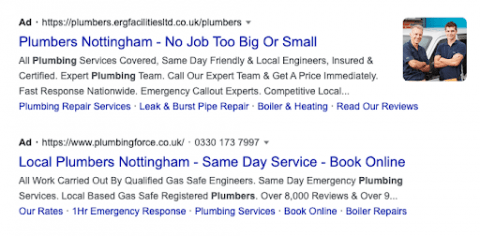 There are still ways to differentiate yourself from other businesses offering a very similar service – you just need to play to your biggest strengths.
There are still ways to differentiate yourself from other businesses offering a very similar service – you just need to play to your biggest strengths.
Here are some methods of differentiation you could use as per MarketResearch.com:
- Product – most notable but easily duplicated and could be short-lived
- Service – training, installation, speed, ease of doing business etc.
- Distribution – suppliers, manufacturers, distributors or retailers you work with
- Relationship – employees and customer service could be an effective means to differentiate. Perhaps add a review service such as a Trustpilot rating
- Image/Reputation – this can be established through your current customers who can later become your advocates
- Price – again, this can easily be duplicated. However, depending on your product, customers may choose to pay more if there is an added value in doing business with you
3. Get your website basics right
Customers call the shots and users are becoming increasingly demanding in terms of the experience they expect from a website. They want a fast loading website and ease of use as a minimum requirement. As a local business, you may not have the same budget as the bigger, national or international firms, but you can at the very least get the basics right. Take a look at our Core Web Vitals guide for a closer look at how to audit and fix any potential issues related to your site speed.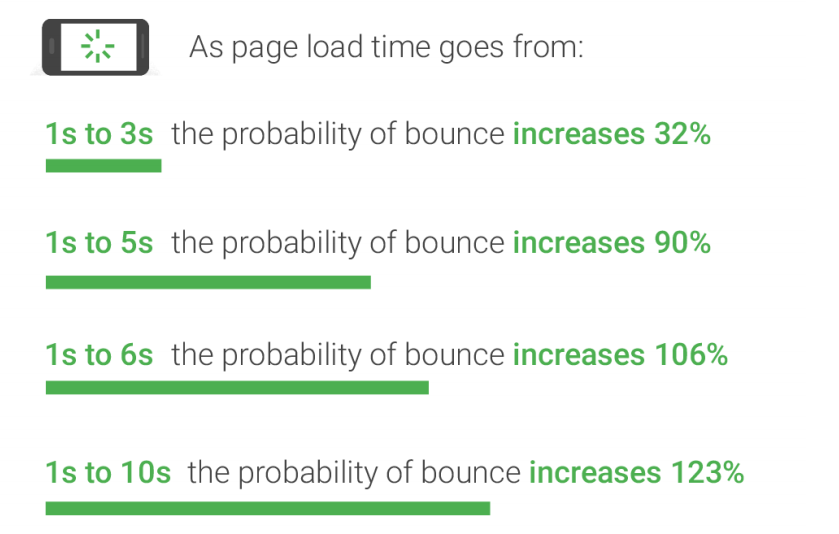 The faster your pages load, the more likely it is that users will stick around. You can see from the stats above how much of an effect a slow website can have on your chances of converting new users into customers. A slow website will also affect your chances of achieving good rankings in Google as user experience is now an integral part of SEO.
The faster your pages load, the more likely it is that users will stick around. You can see from the stats above how much of an effect a slow website can have on your chances of converting new users into customers. A slow website will also affect your chances of achieving good rankings in Google as user experience is now an integral part of SEO.
Google PageSpeed Insights is a fantastic free tool that you can start using straight away to identify any issues and reduce the loading time of your website to decrease bounce rates.
4. Improve Google My Business listing and customer reviews
Your online reputation as a small business owner could be the deciding factor when a prospective customer is searching for your product/service. Luckily, with Google My Business, you have a level of control when it comes to managing how people perceive your business.
Some of the common mistakes to avoid include:
- Duplicate listings
- Setting up unnecessary new listings after a change of address
- Business name misuse e.g. adding unnecessary promotional messages
- Not keeping your listing up to date and providing potential customers with erroneous information such as opening hours
Customer reviews aren’t anything new, but you would be surprised as to how often they are overlooked. Research shows that, in 2021, 77% of customers ‘always’ or ‘regularly’ read reviews when browsing for local businesses so we would recommend this to be a top priority of your digital marketing strategy.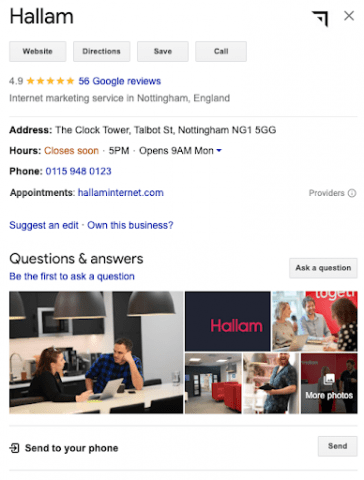
5. Create interesting blog content
If you’re in a very competitive industry – and most local businesses are – you need to think about a content strategy that will drive results. When it comes to SEO, it is highly unlikely that you will rank on the first page of Google for a broad term such as “plumbing Nottingham” in the short term, particularly if SEO has never been part of your strategy before.
This is where your blog content plays an important role. It will help you get found but it will also give you something to share on your social channels. It will allow you to forge a deeper connection with your customers and showcase your knowledge.
How? We’ve got you covered with our guide on how to write great blog posts that engage readers and drive traffic.
Tips include:
- Putting the audience first
- Making sure it’s SEO friendly
- Correct tone of voice
- Showing readers they can trust you
The below screenshot is an example of how we increased organic traffic for a local business in Nottingham through researching what blog content they could produce in-house.
No matter whether you are a plumber or a restaurant, a small business blog will help you grow.
6. Create professional visual content
Visual content is still king and needs to be an important part of your digital strategy.
Video in particular is an area that has grown at an incredible rate in recent years, and these statistics from HubSpot show why:
- 94% of marketers agree that video has helped increase user understanding of their product or service
- 87% say it helped them increase sales and leads
- 86% of businesses use video as a marketing tool, meaning that you might be left behind by the competition
Also, an important stat which shows how important video is today is the fact that YouTube alone has over 2.5 billion monthly active users.
Big brands understand the power of video marketing and constantly create big-budget video campaigns as per the below examples.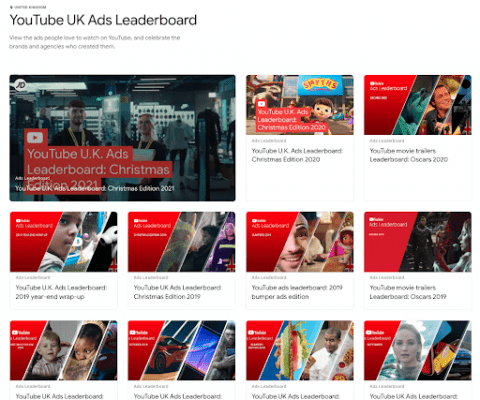
YouTube UK Ads Leaderboard
You might not have the big budgets, but you can always partner up with a talented local video agency/freelancer to get your own video campaign started.
7. Improve your local SEO
Local SEO is the practice of optimising a website in order to increase traffic, leads and brand awareness from local search. In a nutshell, when potential customers turn to Google to look for a local business, you want to be right in front of those searches.
From on-page and technical SEO to link building and reviews, take a look at our local SEO checklist for the top things that you should take into account when it comes to optimising a website to target local areas.
8. Develop email marketing
Another digital strategy fundamental for your small business is email marketing.
There is a really comprehensive email marketing guide from Simply Business which ensures you cover all the essential email marketing questions including:
- Do you know the legal side of email marketing?
- Have you chosen a provider?
- Do you know what your competitors are doing?
- Do you know how to craft an effective email?
The guide also includes checklists, provider comparisons and split testing guidance.
If you are struggling with this area or need to solidify your knowledge, you can also complete a free email marketing certification course from HubSpot. 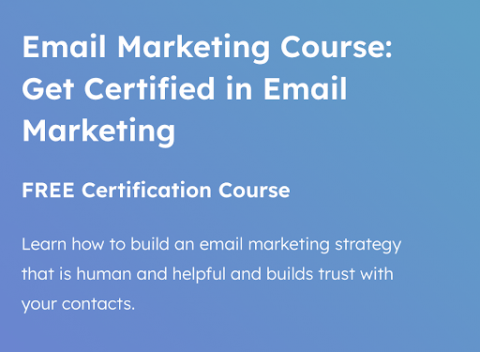
9. Focus on a primary social media channel
Social media marketing strategies are continuously changing along with constant updates but these platforms remain a free and easy tool for businesses to connect directly with people interested in their products or services.
If you’re feeling overwhelmed and don’t know where to start, begin by focusing on the social media platform most relevant to your business and where your customers are most active. As a small business owner, you probably won’t have the required resources to manage more than one channel effectively so it’s important to maximise the time that you do have available.
- If the nature of your product/service offering is B2B then LinkedIn and/or Twitter will be the natural choices
- For B2C businesses, Facebook, Instagram and/or TikTok might be a more effective option
10. Partner with local influencers
Influencer marketing isn’t just for big business. Nor is it just for the fashion industry. Working with influencers and having them recommend your products or services to their following can be extremely effective for small businesses too. For example, a restaurant could reach out to local food bloggers to raise awareness or a gym could work with local fitness influencers in return for publicity.
From giveaways and brand ambassadors to discounts and collaborations, influencer marketing campaigns can take many different forms so it’s key to start with an end goal in mind. What are your marketing goals and what are you trying to achieve? Having clear goals will enable you to reach out to the right people and craft an effective campaign.
From insightful market research to a social media strategy that delivers, there are plenty of digital marketing techniques that small businesses can work on without breaking the bank.
Should you have any questions on anything you’ve read today, please reach out and we’ll be happy to help.






